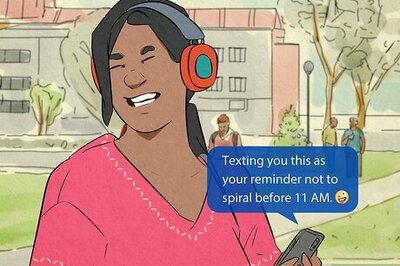
views
Listen to upbeat music.

Music at a fast tempo makes you feel happy and energized. To get started, make a playlist of your favorite upbeat music. Listen to it in the morning when you get ready for school, on the way to school, and between classes. If upbeat music isn’t really your thing, just make a playlist of whatever songs you love that make you feel good!
Focus on the good things about school.

A little positive thinking can go a long way towards improving your mood. Think about the bigger picture and how your education will have a positive impact on your life in the long run. If you’re having a bad day, tell yourself that you only have to be in school for a relatively short period of your life. After that, the sky is the limit! If something in particular upsets you, like a bad grade, an argument with a friend, or not making a sports team, stop worrying and try to put it in a bigger context. Chances are this one bad grade, argument, or rejection will not have a major long-term impact on your life.
Go outside for a few minutes.

Spending time outside naturally makes you feel happier. Even if it’s just for 5 minutes between classes, make an effort to go outside whenever you can. Go for a short walk or review your notes for an exam outside during lunch or on a break. If you can take either an indoor or an outdoor route between classes, choose the outdoor option to get some fresh air and help boost your mood!
Get some exercise.

Physical activities release endorphins, increasing feelings of happiness. Go for a walk or do some stretching during your lunch break to get moving during the school day. Take a physical education class if you can to spend a whole chunk of your day playing sports to get some physical activity in! You can also improve your overall moods during the week by working out after school and on the weekends. If you aren’t an athletic person, try lifting weights, doing yoga, or signing up for a martial arts class. You don’t have to be good at sports to exercise and feel good!
Do something nice for someone.

Making other people smile can boost your own happiness. Give another student a compliment or some positive encouragement. Or, thank a teacher for a fun activity or an interesting lesson. Remember that you’re probably not the only one who struggles to feel happy at school all the time. If you see someone else that looks like they might be feeling down, tell them you like their outfit or give them a compliment on a presentation they gave in class.
Smile more often.

It’s scientifically proven that smiling instantly improves your mood. Try to smile more at the people you interact with at school. Even if you aren’t feeling it, “fake it till you make it” and force a smile when you pass someone you know in the hallway or when someone makes a joke in class.
Use feedback to improve your grades.

You’re bound to feel down if you take feedback from teachers poorly. Whenever you don’t do so great on an assignment or a test, listen to the teacher’s feedback closely instead of getting down on yourself for a less-than-stellar grade. Then, implement that feedback on your next assignment or exam to improve your work. If you receive a low grade without any feedback or feel that you were graded unfairly, ask to talk to your teacher privately to find out why they gave you that grade.
Talk to a friend if something’s bothering you.

Getting things off your chest helps you feel better. If something is on your mind, don’t bottle it up. If you’re stressed about an upcoming assignment, upset with someone in your life, or disappointed about a bad grade you received, talk about what you’re feeling with a friend. If you’re stressing about how much work a big assignment is, talk with a friend in the same class about how to break the assignment down into parts over time. If you’re upset with a friend, go to that person directly and talk to them about what happened to try and resolve the issue. If you’re disappointed about a grade, focus on the next assignment. Talk to your friend about ideas for how to improve, such as by studying together or exchanging notes.
Journal your thoughts.

One of the best ways to process thoughts and feelings is to keep a journal. It doesn’t matter what you write in your journal — just write down everything you’re thinking and feeling to get it all out. Then, review what you wrote down to help you process it and feel better. Find a cool notebook that you like and try to write in it once or twice during your school day. Try to write down one thing you are grateful for each day in addition to any negative emotions you’re dealing with to help yourself feel more positive.
Treat yourself once in awhile.

Being nice to yourself can make you feel instantly happier. Eat a favorite food for lunch or bring a favorite snack with you to class to cheer you up. Or, give yourself something to look forward to after school, like going to see a movie at a theater or watching your favorite TV series on the couch. Starting your day with something you enjoy can help improve your mood before school as well. For example, sit and enjoy a cup of your favorite tea before you start getting ready for the day.
Try not to take negativity from others too hard.

If someone isn’t nice to you at school, it’s probably not your fault. Try to remember that nobody is perfect and think about what might be going on in their lives that makes them act negatively towards you. Try your best to brush off a dirty look or a nasty comment and move on with your day instead of dwelling on it and getting angry and upset. If there’s someone at school that’s bullying you and/or making you feel bad and unhappy on a regular basis, this is a bigger issue than a one-off comment or action. If you feel that you’re being bullied or have a major issue with another student, speak to a teacher or another adult you trust about what you can do to resolve the issue.
Accept that there will be bad days.

If you learn to take bad days in stride, you’ll feel happier more often. Remember that there are always going to be little things that go wrong and hurdles to jump over in school, but they don’t last forever. If you’re having a bad day, just do your best to get through it! For example, if you’re feeling bad because you like someone and they don’t like you back, just remember that this isn’t the only person you’re ever going to have feelings for. There are plenty of fish in the sea!
Avoid procrastination.

Schoolwork is less stressful when you complete it ahead of time. When you get a big assignment, break it up into small chunks and give yourself mini deadlines to get it all done on time and at a manageable pace. If you have a test coming up, don’t wait to study until the night before. Instead, study 20-30 minutes a night in the days leading up to it. Try to remove any distractions when you do schoolwork. Go to a quiet place where you can work, such as a library, a coffee shop, or even just a quiet room in your home. Use a planner to help you stay on track with your workload. Find a design with enough space to schedule everything you need to stay on top of.
Ask teachers for different assignments if you’re bored.

Sometimes, you might be more advanced in certain subjects. If your schoolwork is really boring you because it’s too easy, ask your teachers for harder assignments. Or, ask for extracurricular projects to do. For example, if math comes really naturally to you, you could ask your teacher to assign you problems from the next class up or even to move you up to the next class.
See a school counselor if you feel really unhappy.

The job of your school counselor is to help make your experience better. Stop by their office and ask to talk if you can’t keep up with school work or if you feel like you’re being bullied by other students. Be honest about your feelings with the counselor and ask them to help you come up with solutions to make your time at school better. School counselors have access to all kinds of resources to help you out. For example, if you’re struggling in a particular subject, they can set you up with a tutor to help you improve.




















Comments
0 comment